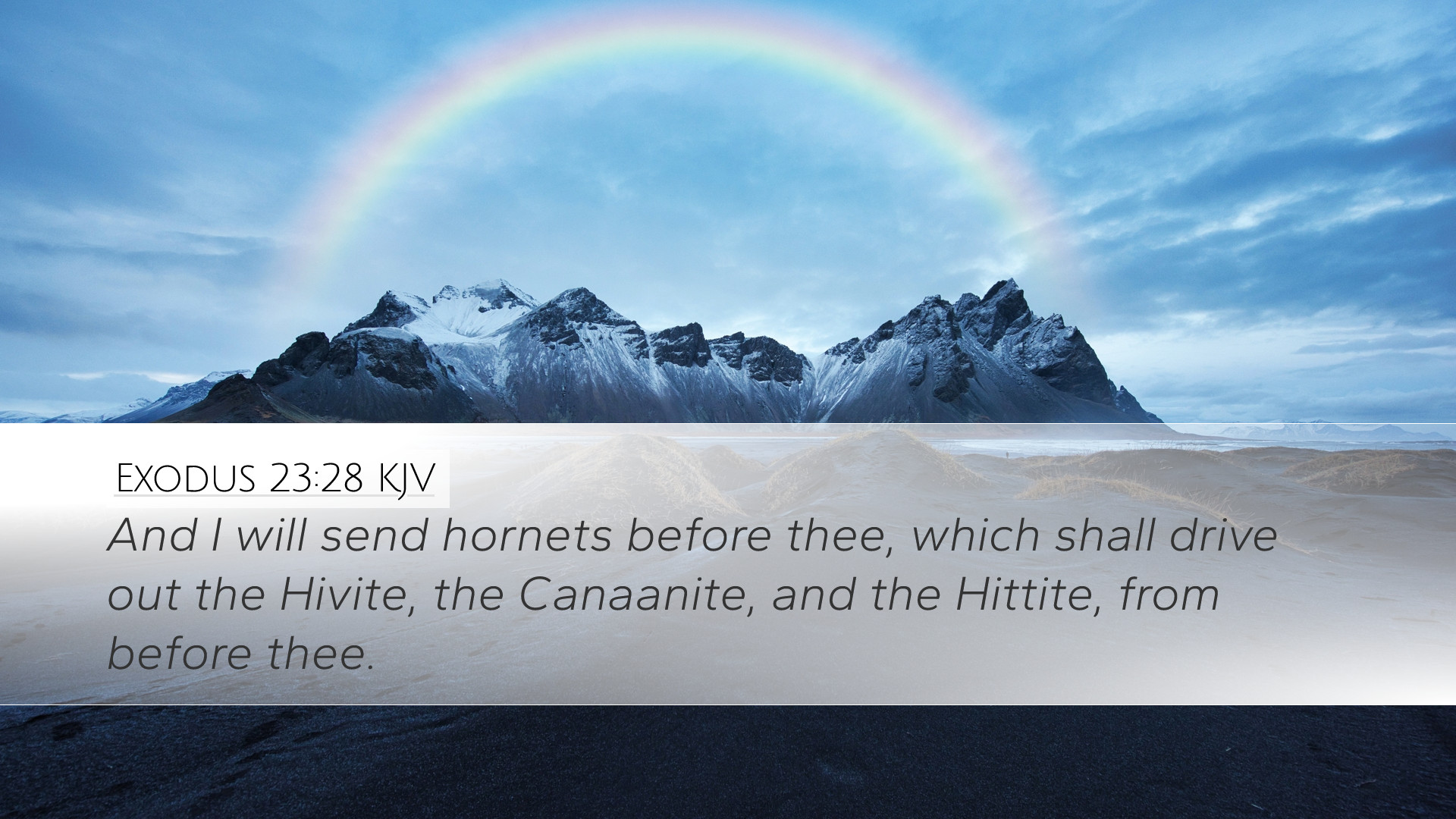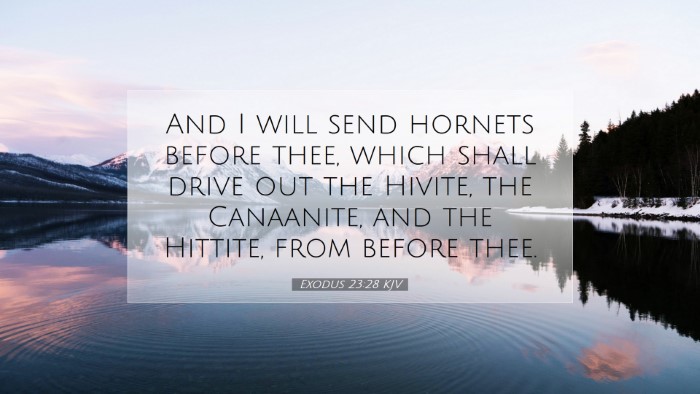Commentary on Exodus 23:28
Verse: "And I will send hornets before you, which shall drive out the Hivite, the Canaanite, and the Hittite from before you." (Exodus 23:28)
Exodus 23:28 presents a profound statement about God's intervention on behalf of His people as they prepare to enter the Promised Land. This commentary synthesizes insights from established public domain commentaries to provide a nuanced understanding of this verse's implications for contemporary believers.
Context and Setting
This verse is situated within a broader passage where God outlines the promises and commandments to the Israelites as they embark on a transformative journey. The Lord reassures them of His presence, guidance, and the extraordinary means by which He will secure their victory over the inhabitants of Canaan.
Theological Significance
Divine Assurance: God's declaration of sending hornets is symbolic of His omnipotence and sovereignty. Commentators like Matthew Henry emphasize that this example illustrates God's ability to utilize nature and extraordinary means to achieve His divine purposes. It serves as a reminder to believers of God's detailed involvement in the affairs of their lives.
Hornets as Instruments of Judgment
Historically, hornets have been viewed not merely as creatures of nature but as agents of divine judgment. Adam Clarke notes the metaphorical significance as well as the literal implications, suggesting that God would utilize these insects to instill fear, chaos, and confusion among the Canaanite tribes. Here, the hornets represent a unique strategy of warfare that does not require direct conflict.
God's Strategy in Spiritual Warfare
Preparation: In spiritual warfare, the Lord often prepares the ground rather than allowing His people to confront overwhelming opposition head-on. His plan derives from wisdom beyond human comprehension, and the reference to hornets embodies His unconventional methods. Albert Barnes suggests that this divine strategy of subduing foes reflects God's desire for His people to rely on Him rather than their own strength.
Gradual Conquest
The verse also indicates a progressive approach to conquest. God explains that He will not drive out the inhabitants all at once but rather in phases. This gradual approach minimizes devastation to the land and allows the Israelites to grow and thrive without being overrun. Matthew Henry comments on this strategic timing, asserting that God knows the needs and capacities of His people better than they do themselves.
The Hivites, Canaanites, and Hittites
The mention of these specific groups points to the reality of the spiritual battles that Israel would face. Each of these nations represented different theological and ethical challenges. Albert Barnes elaborates on how the presence of these tribes symbolizes various sins and idolatries that Israel must resist to remain faithful to God. The conquest over these nations becomes emblematic of the spiritual warfare believers engage in today.
Symbolism of Hornets
Fear and Confusion: The hornets are also seen as a metaphor for the fear that God's enemies will experience upon recognizing His intervention. Clarke explains that just as hornets can cause panic amongst those who encounter them, so too will the Canaanites panic at the sight of a God-led Israel. This foreshadows the spiritual truth that the fear of the Lord brings about chaos in the camp of the enemy.
Application for Believers
For contemporary believers, Exodus 23:28 serves as an encouragement concerning God's provision and protection. It exemplifies how God can fight battles on our behalf, often using unexpected resources or strategies. Matthew Henry points out that even in seemingly dire circumstances, trusting in the Lord can yield miraculous results.
Trust in God's Timing
Patience in Process: Just as Israel faced a gradual conquest, believers are called to exercise patience as they face their own trials. Spiritual growth often requires enduring challenges over time. Clarke promotes the notion that believers shouldn't rush God's timing, as His methods and pace are designed for their ultimate benefit.
Living Under Divine Protection
Believers are assured of their divine protection, akin to the Israelites in their journey. Barnes reminds us that God's commitment to shielding His people should calm fears, enabling them to engage in their spiritual battles with the knowledge that they are not alone.
Conclusion
Exodus 23:28 encapsulates a profound truth regarding God’s active engagement in the lives of His people. The use of hornets signifies divine intervention, preparation, and strategy in confronting evil. For pastors, theologians, and students of the Word, this passage serves as a reminder of God's faithful character, encouraging reliance on His power and timing. The message remains relevant, inviting believers to trust in God's plan as they navigate the challenges of their own Christian journeys.


